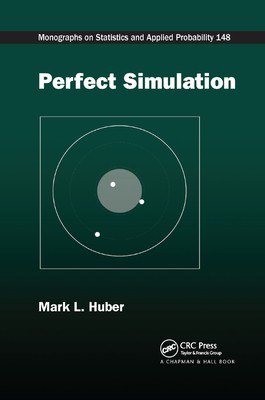
- We will send in 10–14 business days.
- Author: Mark L Huber
- Publisher: CRC Press
- ISBN-10: 0367377195
- ISBN-13: 9780367377199
- Format: 15.6 x 23.4 x 1.4 cm, softcover
- Language: English
- SAVE -10% with code: EXTRA
Reviews
Description
Exact sampling, specifically coupling from the past (CFTP), allows users to sample exactly from the stationary distribution of a Markov chain. During its nearly 20 years of existence, exact sampling has evolved into perfect simulation, which enables high-dimensional simulation from interacting distributions.
Perfect Simulation illustrates the application of perfect simulation ideas and algorithms to a wide range of problems. The book is one of the first to bring together research on simulation from statistics, physics, finance, computer science, and other areas into a unified framework. You will discover the mechanisms behind creating perfect simulation algorithms for solving an array of problems.
The author describes numerous protocol methodologies for designing algorithms for specific problems. He first examines the commonly used acceptance/rejection (AR) protocol for creating perfect simulation algorithms. He then covers other major protocols, including CFTP; the Fill, Machida, Murdoch, and Rosenthal (FMMR) method; the randomness recycler; retrospective sampling; and partially recursive AR, along with multiple variants of these protocols. The book also shows how perfect simulation methods have been successfully applied to a variety of problems, such as Markov random fields, permutations, stochastic differential equations, spatial point processes, Bayesian posteriors, combinatorial objects, and Markov processes.
EXTRA 10 % discount with code: EXTRA
The promotion ends in 17d.04:31:13
The discount code is valid when purchasing from 10 €. Discounts do not stack.
- Author: Mark L Huber
- Publisher: CRC Press
- ISBN-10: 0367377195
- ISBN-13: 9780367377199
- Format: 15.6 x 23.4 x 1.4 cm, softcover
- Language: English English
Exact sampling, specifically coupling from the past (CFTP), allows users to sample exactly from the stationary distribution of a Markov chain. During its nearly 20 years of existence, exact sampling has evolved into perfect simulation, which enables high-dimensional simulation from interacting distributions.
Perfect Simulation illustrates the application of perfect simulation ideas and algorithms to a wide range of problems. The book is one of the first to bring together research on simulation from statistics, physics, finance, computer science, and other areas into a unified framework. You will discover the mechanisms behind creating perfect simulation algorithms for solving an array of problems.
The author describes numerous protocol methodologies for designing algorithms for specific problems. He first examines the commonly used acceptance/rejection (AR) protocol for creating perfect simulation algorithms. He then covers other major protocols, including CFTP; the Fill, Machida, Murdoch, and Rosenthal (FMMR) method; the randomness recycler; retrospective sampling; and partially recursive AR, along with multiple variants of these protocols. The book also shows how perfect simulation methods have been successfully applied to a variety of problems, such as Markov random fields, permutations, stochastic differential equations, spatial point processes, Bayesian posteriors, combinatorial objects, and Markov processes.


Reviews